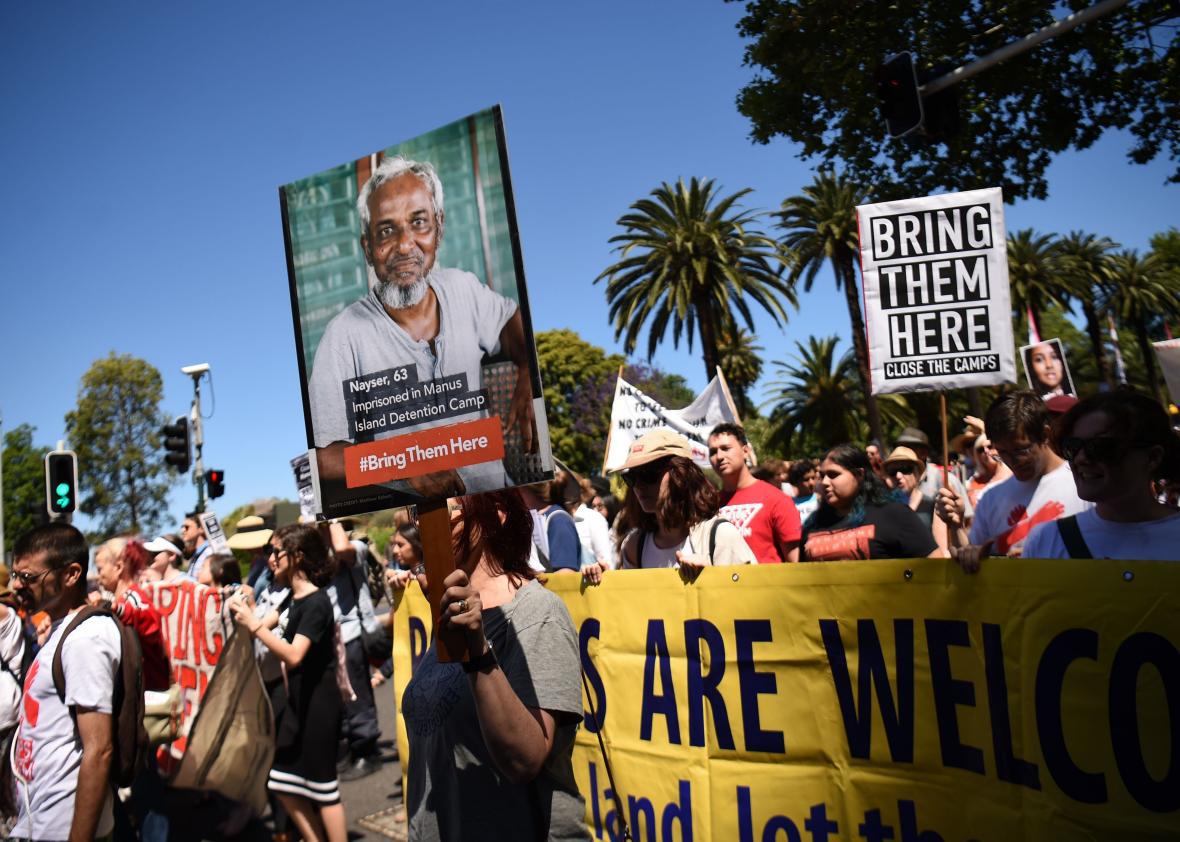The Washington Post today published a leaked transcript of a testy phone call in January between President Trump and Australian Prime Minister Malcolm Turnbull. Trump critics have—for good reason—focused on a portion of the call in which Trump appears to be almost willfully misunderstanding Turnbull’s repeated explanation of a deal he had reached with the Obama administration under which the U.S. agreed to settle 1,250 refugees being detained offshore by Australia. Trump is utterly convinced that his predecessor was duped into accepting 2,000 (he’s “also heard like 5,000”) potential terrorists (“I guarantee you they are bad. That is why they are in prison right now. They are not going to be wonderful people who go on to work for the local milk people.”) He persists in this belief despite Turnbull explaining that the U.S. has the right to vet anyone it takes in, and that the people in question are being imprisoned not because they are “bad” but because Australia has a policy of not allowing any refugees who arrive by boat onto its soil, in order to discourage human-smuggling.
The most impressive takeaway from this story may be that through sheer pigheadedness, Trump has somehow managed to make the prime minister of Australia look like the reasonable and compassionate one in a conversation about refugee policy.
Australia has been widely condemned by human rights groups and the United Nations for its draconian immigration and refugee policies, particularly its practice of imprisoning boat-borne refugees in camps on the islands of Manus (part of Papua New Guinea) and Nauru.
The U.N. Special Rapporteur for the Human Rights of Migrants has described the conditions at the Nauru camp as “cruel, inhuman and degrading.” According to Amnesty International, those transferred to Nauru—one of the world’s smallest independent countries and heavily dependent on Australian aid— are often housed for more than a year in vinyl tents with indoor temperatures regularly reaching 122 degrees:
Refugees and asylum seekers described conditions in these detention camps as “prison-like,” with regular searches of their tents by the guards, confiscation of “prohibited” items—including food and sewing needles—two-minute showers, and filthy toilets.
Leaked files published by the Guardian show a widespread pattern of abuse of children at the camp, including sexual assault. There have been multiple cases of self-immolation by detainees protesting their treatment.
Conditions at Manus are similarly dire, and documents obtained by the Guardian in May showed a deliberate policy on the part of Australian authorities to make conditions as inhospitable as possible in order to coerce residents to leave. In April, Amnesty International documented an incident in which Papua New Guinea soldiers fired guns at the camp and attacked residents and staff. “The Papua New Guinean Police later stated that the incident involved ‘drunken soldiers’ going on a ‘rampage’, indiscriminately attacking refugees, service providers working at the center and police officers,” according to the report. Camp residents are now being relocated against their will to another facility. A New Guinean court ruled that the facility at Manus was illegal last year and the residents are currently being moved—against their will—to another facility. Just this week, residents protested after water and electricity was cut at the facility and refugees were reportedly attacked by assailants with machetes last weekend.
Many of those detained have been formally recognized as refugees, meaning that Australia is in violation of its obligations under the 1951 Refugee Convention, which forbids the transfer of refugees to places where they are likely to face harm. The U.N. Special Rapporteur on Torture has also accused Australia of violating the Convention Against Torture.
As for Turnbull, under pressure from the increasing anti-immigrant sentiment and a resurgent far-right, he’s doubled-down on this controversial policy by proposing a lifetime ban of any asylum seeker who arrives by boat from ever entering Australia.
In other words, while Turnbull may be capable—unlike Trump—of sounding like an informed, rational adult when discussing these matters, he doesn’t exactly possess a great deal of moral authority. As Trump put it in a rare moment of clarity during their conversation, “We should do that too. You are worse than I am.”
